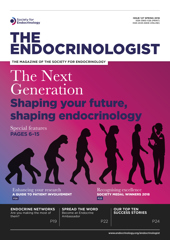Umasuthan Srirangalingam examines the value and importance of broadening your career while still focusing on the specialty of endocrinology.
WHY DO YOU NEED ACUTE MEDICINE?
On reflection, some of my most memorable endocrine patients have presented to me on the acute medical take. Seeing the patient present, de novo and undifferentiated, following as the diagnosis unfolds, can provide an unparalleled buzz. The elderly gentleman, non-specifically unwell, losing weight and with a fever; the young mother found confused at home, who failed to pick her children up from school; the man presenting with shortness of breath and a low calcium…*
Of course, as the vast majority of UK endocrinology and diabetes consultant posts have an acute medical component, acute medical competence is an essential skill for those in specialist training grades, to enhance employability and secure a consultant job. But if you do have a choice, why would you opt to do acute medicine?
‘Acute medicine is the equivalent of the “lifestyle modification” I so often advocate for my patients… It’s good for me!’
Undoubtedly there is security in the ‘ivory tower’ of specialty medicine, insulated from the unpredictable variations of the acute medical take. The early starts and late finishes, the intensity of work, the vast number of decisions to be made, the pressure to discharge, being confronted with unknowns – all are much greater on the acute take. However, while specialty medicine, in isolation, may feel safer, I suggest that you would lose some of the variety and colour that keeps medicine appealing and fresh.
Acute medicine is the equivalent of the ‘lifestyle modification’ I so often advocate for my patients… It’s good for me! It unquestionably makes me a better physician. It stretches me, keeps me grounded and more relevant.
Participation allows me to keep abreast of new insights across a broader range of specialties. Endocrinology and diabetes by their very nature are multisystem specialities. The very best endocrine and diabetes physicians that I have seen and worked with have, first and foremost, always been excellent general physicians and, independent of their rank, were invariably on the front line.
Acute medicine provides an excellent environment in which to network, by interacting with colleagues over a challenging case, by ensuring that the patient gets access to specialist input early on, and by knowing whom to contact. That network can pay dividends. Some of my most fruitful collaborations have been struck up along the corridors of the acute medical unit. Joint clinics have been set up, diagnoses have been made, and management strategies have been modified based on chance interaction.
‘Rather than being an inconvenient part of service provision, acute medicine should be seen as the pinnacle of what we do. It deserves real enthusiasts to champion it.’
WHY DOES ACUTE MEDICINE NEED YOU?
To be an effective service, acute medicine needs buy-in from all parties: there needs to be commitment to the cause. By participating, the endocrine and diabetes physician will have a greater influence and a say in the development of acute services.
In the era of the multimorbid patient, providing the holy grail of ‘holistic care’ requires the endocrine and diabetes physician to deliver specialty input, but with an appreciation of a patient’s co-morbidities and other treatments. Integrated care is more effectively facilitated by a specialty physician embedded in acute medical services.
And looking to the future, recruiting the next generation of endocrine and diabetes physicians is critical to maintaining the specialty. Our future career choice is often based on meeting an inspirational clinician early in our career whom we aspire to emulate. The erosion of team structures in modern medicine can mean that trainees get only limited exposure to certain specialties, with the consequent knock-on effects in recruitment that we are currently seeing. To recruit the best and brightest talent, trainees need to be exposed to the specialty and to see that endocrinology and diabetes is the sine qua non for acute medicine.
ACUTE MEDICINE – THE HEART OF THE HOSPITAL
The load on the acute medical service has undeniably risen, with increasing numbers attending A&E, pressures on beds and hospital flow, patients living longer with multiple complex conditions, and limits on social care provision. Acute medicine, and those who deliver the service, needs to absorb all of these pressures. But great challenges provide great opportunities. These include finding different ways to work, to innovate, to educate frontline staff, to integrate research and, ultimately, to improve patient care. It is incumbent on management to acknowledge these additional challenges and incentivise those who take on these roles.
I believe that the health of the acute medical service is a reflection of the health of the hospital as a whole. I am proud to report that, at University College London Hospitals, the Chief Executive of the Trust, the head of the National Institute for Health Research’s Biomedical Research Centre and the Department of Health’s Chief Scientific Adviser all regularly take part in the acute medical rota. It sends out a crucial message, and is testament to the importance of this activity and its role in the life of the hospital. Rather than being an inconvenient part of service provision, it should be seen as the pinnacle of what we do. It deserves real enthusiasts to champion it.
Umasuthan Srirangalingam, Consultant Endocrinologist, University College London Hospitals
*These patients were diagnosed with disseminated histoplasmosis causing adrenal insufficiency; insulinoma; and hypoparathyroidism-associated cardiac failure.






